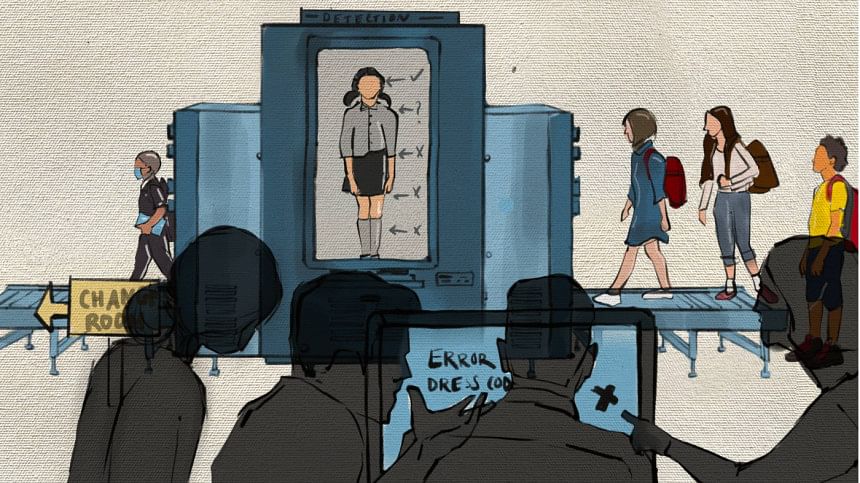In the name of dress codes

Lakshmipur madrasa teacher Manjurul Kabir Manzur made headlines in October 2021 when he was sent to jail for cutting hair of six students. Many similar incidents are reported across the country, where educators in question go as far as physically assaulting and publicly humiliating their students for failing to maintain a look "appropriate" for school.
Schools claim that dress codes foster equality and inclusivity, dissolving differences in race and social classes for example, and professionalism because homogeneity in pupils' appearances means that they are not distracted by each other's looks. However, very few people can explain exactly what professionalism students learn when their teachers grab them by their collars to cut their hair or where the inclusivity is in asking curvier girls to ditch skirts and shirts in favour of salwar kameez to hide their bodies better.
Rules about students' appearances such as no nail polish, henna, or loose hairstyles for girls and no long hair for boys are valued as unbreakable laws in our educational institutions. Acts of violence perpetuated by teachers for breaking these rules should make us wonder how strongly these rules should be enforced and more importantly, if they should exist at all.

Extreme measures to police students' appearance promotes values that no institution, especially educational ones, should promote: suppression of individuality and privacy.
Tazreen Jahan Bari, recent graduate of Bangladesh University of Professionals, recalls, "There was a time in my school when girls had to take their socks off to show if they had nail polish on their toenails."
While this is problematic on its own, we should also recognise that this invasion of privacy contributes to the continuation of very toxic practices in our society like body shaming, gendering fashion, and sexualisation of underage girls.
It gets especially worrisome when this desire to control what students wear branch out of the classroom. I still remember how a supervisor at my school once called in one of my friends, in the middle of class, just to berate her for 15 minutes because he had seen her out with her mother the evening before when she had committed the cardinal sin of wearing jeans.
Standardised dressing in schools does not have to be so problematic, in my opinion. The idea of all students being on a level ground is something anyone can get behind. It is only when there is absolutely no room for students' individual identities and independence that dress codes become unwelcome and ironically, discriminating.
Ultimately, we must remember why we need education in the first place: to be free and let free. When it comes to fighting for freedom in our overly reactionary education system, I cannot think of any better place to start than our own bodies.
Fabiha is secretly a Lannister noblewoman and a Slytherin alum. Pledge your allegiance and soul to her at [email protected]

 For all latest news, follow The Daily Star's Google News channel.
For all latest news, follow The Daily Star's Google News channel. 



Comments